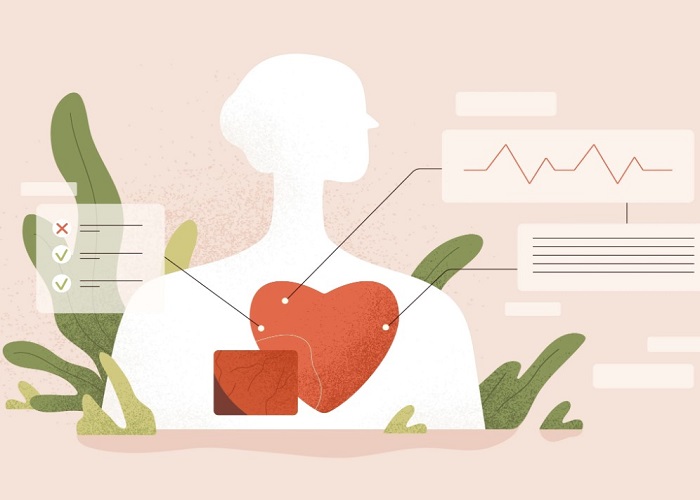Transient fast heart rhythms often occur in everyday life situations like experiencing stress, anxiety, and fear. But consistently abnormal heart rhythm is typically due to some underlying condition that requires medical evaluation.
In this article, we discuss what causes fast heart rhythms and why they should be a cause of concern for you.
Tachyarrhythmia: Fast Heart Rhythm
Abnormal rhythm, i.e., arrhythmias, can make your heart beat slower or faster. According to studies, 1.5 to 5% of the general global population suffers from arrhythmias. Faster than the normal rhythm of the heartbeat is termed tachyarrhythmia or tachycardia.
Faster heartbeats are not always a medical concern. But you must not overlook a resting heart rate of more than 100 beats per minute. The condition can have grave consequences and even lead to death as it affects blood flow to the heart and other parts of the body.
What Causes Tachyarrhythmias?
There are several causes and risk factors for abnormal heart rhythms. These include:
- Medicine side effects
- Fever
- Stress
- Smoking and alcohol use
- Hypertension (high blood pressure)
- Electrolyte imbalance
- Hyperthyroidism
Heart diseases can also trigger a fast heartbeat, including a heart attack, coronary artery disease, and atrial fibrillation.
Wolff-Parkinson-White Syndrome is a rare disorder that can cause significant fastening of heart rhythm and heartbeat.
Tachycardia due to postural change is caused by a neurological condition called postural orthostatic tachycardia syndrome (POTS).
Unlike other muscles that take commands from the nervous system, the heart takes its nervous stimuli from the sinoatrial node (found in the top right corner of the heart), which generates a regular heartbeat. Cardiac disorders can disrupt nodal activity and lead to arrhythmias.
Types of Fast Heart Rhythms
The heart comprises four components, i.e., two upper chambers, known as atria, and two lower chambers, called ventricles. A sequential contraction of the atria and ventricles enables blood flow to the lungs and the rest of the body. Based on the location of the disorder, tachyarrhythmia can be of different types.
Atrial Fibrillation
Atrial fibrillation is the most common type of abnormally fast heart rhythm, which causes rapid contractions of the atria. The condition can put you at risk of stroke.
Atrial Flutter
Atrial flutter is similar to atrial fibrillation, where the ventricles also speed up but with a regular pattern.
Ventricular Tachycardia
Ventricular tachycardia is a lethal condition that starts in the ventricles. The ventricles do not contract due to the rapid heartbeat, which reduces blood flow to the body.
Supraventricular Tachycardia
Supraventricular tachycardia is when the fast heartbeat in the atria starts and ends abruptly.
How Do I Know I Have an Abnormal Heart Rhythm?
A fast heart rate often presents no symptoms at all. However, some symptoms warrant immediate medical attention.
Below are the most symptoms of an abnormally fast heart rhythm that you might experience:
Shortness of Breath
Atrial fibrillation patients present with dyspnea (shortness of breath). Clinical studies have revealed the link between breathing difficulties and arrhythmias.
Chest Tightness/ Pain
Chest tightness is mainly due to shortness of breath. The lungs try to compensate for the decreased blood flow due to abnormal heart rhythms.
Heart Palpitations
The feeling can be temporary (during fright or fear). If the galloping of the heart does not resolve, it might be an arrhythmia. Visit a primary care healthcare facility if suffering from unexplained persistent tachycardia.
Pulse Elevation
You might also notice an increase in your pulse associated with other symptoms. The pulse rises due to abnormal pumping of the heart.
Fainting
Several patients experience lightheadedness which may convert into fainting. Rushing to a hospital if you faint due to a fast-beating heart is pivotal.
Why Should You Look Out for Symptoms?
Tachycardia is generally treatable with medicines and surgical interventions. However, it can lead to serious health complications and even death without timely treatment. Untreated tachycardia can cause:
Stroke
Ischemic stroke is a common presentation of atrial fibrillation. Several tachycardia cases go undiagnosed until a stroke occurs.
Researchers have identified stroke to be a major complication of tachycardia. Thus, physicians pay special attention to early diagnosis and treatment of atrial fibrillations. Anticoagulant therapy is effective in preventing cardioembolic stroke chances in tachyarrhythmia patients.
Heart Failure
Tachycardia can lead to heart failure. Research suggests that atrial fibrillation and heart failure coexist in about 30% of patients. Undiagnosed atrial fibrillation brings about pathological changes in the heart’s structure, eventually leading to heart failure.
Cardiac Arrest
Life-threatening ventricular arrhythmias can cause a sudden cardiac arrest, leading to sudden cardiac death.
As per a 2021 study, idiopathic ventricular fibrillation is the patients’ underlying cause of unexplained cardiac arrest. Arrhythmias may also increase the risk of a heart attack (myocardial infarction).
Death
As ventricular tachycardia or ventricular fibrillation can cause cardiac arrest, patients must receive timely treatment, or they risk death.
Diagnosing Tachyarrhythmias
Your doctor might order several tests to evaluate your heart rate and condition. A wearable device (Holter monitor), electrocardiogram (ECG), loop recorder, and cardiac event monitor are some of the tests that help reach a diagnosis of abnormal heart rhythms like tachycardia.
Treatment
Treatment is not necessary for mild tachyarrhythmias. However, abnormal heart rhythms can be treated using several strategies, including:
Medicines
Different types of medicines can help restore the regular function of the heart. Cardioselective beta-blockers help slow down the heart rate and make the heart rhythm normal. Studies show that beta-blocker therapy is an effective treatment modality for arrhythmias.
Calcium channel blockers also slow down the force of heart muscle contraction and help reduce heartbeat. Other antiarrhythmic drugs (propafenone and amiodarone) alter the heart’s electrical conduction.
Cardioversion
This treatment involves attaching electrodes to the chest and delivering low-energy electrical shocks that affect the heart’s electrical impulses and restore a normal heartbeat.
Artificial Pacemaker
In severe cases, an artificial pacemaker or implantable defibrillator is surgically inserted in the chest. A pacemaker automatically maintains a normal heart rhythm.
Final Thoughts
Generally, tachycardia without any symptoms is not a medical emergency when induced by stress, fear, anxiety, or exercise. However, some types of tachycardia might cause serious health complications and become life-threatening.
If you notice persistently fast heart rhythms or any symptoms listed above, it is vital to seek prompt medical care.



